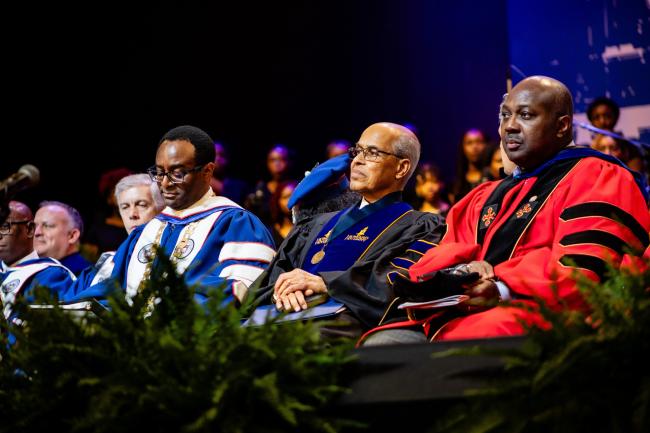By Sholnn Z. Freeman
As the orator of Howard University’s 157th Charter Day on March 1, an impassioned Michael R. Winston, Ph.D. (B.A. ’62), reflected on Howard University’s early history of high ambition and cosmopolitanism, including pioneering strides in women’s education, an achievement that outpaced other U.S. universities by several decades.
Speaking before students, alumni, administrators, and guests gathered at Cramton Auditorium, Winston urged the Howard community to reclaim its past in its quest to become “a research university in the first rank of American higher education.”
“In just months after the charter was granted, the University’s founders had created a racially integrated community surrounding a racially integrated university – a rarity in the country to this day,” said Winston, who spent more than 40 years as a faculty member and administrator at Howard but may best be known for being the founding director of the Moorland-Spingarn Research Center. “They wanted to prove that it was possible to have a racially diverse community and institution of higher education, hoping that it would be a model for a new society.”
Winston challenged the popular idea of Howard’s “humble origins,” which he called a mischaracterization and an “image that deviated from historical reality.” He countered with a description of Howard’s founders, including namesake Civil War General Oliver O. Howard, as daring visionaries who pictured Howard as a pace-setting institution for the rest of the country to follow in the post-war period.
As an example, Winston pointed to the early integration of women students and faculty at Howard University medical and law schools, which he described as radical for the times.
“In most of American higher education women were not admitted at all to universities,” Winston said. In the legal education, he noted that the Harvard and Georgetown law schools did not admit women until 1950 and 1951 – more than 70 years after women were admitted to Howard’s law school.
Each year, the founding of Howard University is celebrated through the Charter Day Convocation and Charter Day Dinner, which will be held Saturday. Charter Day is a time-honored tradition commemorating the signing of the federal charter on March 2, 1867, by President Andrew Johnson establishing Howard as a university.
Howard University President Ben Vinson III, Ph.D., voiced similar ideas in his convocation remarks. Vinson, who is attending his first Charter Day as president, said he recently completed a campus listening tour, visiting all 14 schools and colleges of the University. He said a medical school student made a particularly poignant observation.
“She said that it is both vital for us to honor Howard’s legacy, and at the same time, to intentionally contribute to it,” Vinson said. “We are here, at Howard University, to draw strength from our legacy, but it is our duty to add new chapters to that legacy. We must build upon the work of the giants whose shoulders we stand upon, to fortify Howard for generations to come.”
Before Winston’s address, there were a series of musical performances, including students from the Howard University Early Learning Program, who joined the Howard University Concert Chorale on stage to perform “Lift Every Voice and Sing.”
The event also included remarks from Howard University Student Association Executive President Nia Naylor, a senior from New Castle, Del. Naylor spoke about the impact made by Howard alumni in a variety of fields, from entertainment to politics, including Vice President Kamala Harris (B.A. ’86), who hosted Naylor and other HBCU students at her home earlier in the week in a celebration of the nation’s HBCUs for Black History Month.
“I had the privilege of visiting her home where she was able to share some of her experiences and the foundation that Howard laid with her,” Naylor said. “This is the future I see for our Bison. I cannot wait to see what each and every one of you do and how President Vinson will continue to drive this amazing University forward.”
Chairman of the Board of Trustees Laurence C. Morse, Ph.D. (B.A. ‘73), spoke about the importance of upholding the guiding principles enshrined in Howard’s founding charter.
“Without question, we’ve accomplished a great deal over these 157 years and yet we recognize the task is far from finished,” Morse said. “At the present time, under the leadership of our 18th president, Dr. Ben Vinson, we have a tremendous opportunity to usher in a new chapter in the history of our University. Indeed, we have the opportunity to achieve, in his words, ‘Howard University at maximum strength.’”

